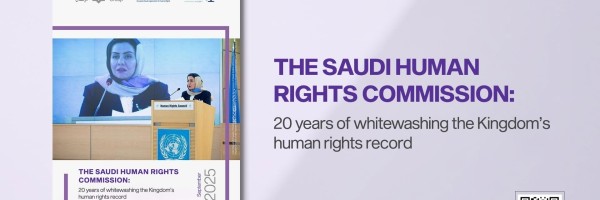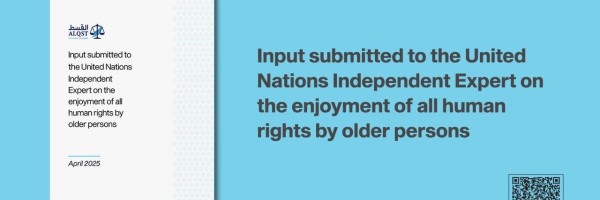READ THE FULL REPORT
Introduction
Saudi Arabia has a monarchical system of government in which the descendants of King Abdulaziz hold a monopoly on power. There is no popular participation in government, nor any oversight or accountability for the actions, decisions or actions of the authorities. As Article 5 of the Basic Law of Governance states, “Monarchy is the system of rule in the Kingdom of Saudi Arabia. Rulers of the country shall be from amongst the sons of the founder King Abdulaziz bin Abdulrahman Al Faisal Al Saud and their descendants.” King Salman bin Abdulaziz came to the throne, on the death of King Abdullah, on 23 January, 2015. His accession ushered in a period of repression unprecedented both in its scope and its range of methods, exceeding in intensity anything seen before in previous eras. During his reign the Saudi authorities have violated both domestic laws and international conventions and have crossed what used to be seen as red lines, such as arresting and assaulting women. Previously, observing such social sensibilities earned the authorities a modicum of respect and – to some extent – popular acceptance. Repression is no longer limited to men, as it generally was in the past. It has been systematically extended to women human rights defenders, and women’s rights advocates in particular. Prominent female activists have been locked up in a sweeping wave of arrests. Civil society organisations continue to be targeted and their members and founders arrested for expressing views or taking part in peaceful gatherings, or for the crime of forming and belonging to such organisations. This report looks at the human rights situation in Saudi Arabia under the rule of King Salman and his son, Crown Prince Mohammad bin Salman (commonly known as MBS), beginning with a brief summary of recent changes before examining these developments in more detail.
A new era, and a broadening of repression
It has been customary in the Kingdom for a new stage of repression to start with every new ruler. Each new king would generally make some faint attempt to distance himself from his predecessor’s repression by taking some small measures to appease the public, before embarking on a crackdown of his own. When one king died and another succeeded him, the new king would traditionally release the prisoners of conscience already being held, then shortly afterwards start making his own arrests. However, the reign of King Salman and his son, Crown Prince Mohammad bin Salman (MBS), broke with this tradition by not releasing a single prisoner of conscience. Trials already under way continued and judicial sentences against those activists were meted out. Domestically, we have seen Saudi authorities target an even wider range of groups – women and men, even the elderly; activists, writers, journalists, and economists; judges, clergymen, businessmen, and even members of the ruling family. There has also been qualitative shift in the nature of their repression, with the return of the ugliest methods of torture, ever greater disregard for laws and customs, heavier legal penalties and a broader misuse of capital punishment. There has been a sharp upturn in political arrests, the muzzling of dissent, and the hounding of activists. The authorities have been banning and obstructing the work of civil society organisations, controlling and censoring media outlets, intimidating journalists and writers, and continuing to discriminate against religious minorities. One extreme example of the authorities’ repression was the excessive use of armed force – including artillery – in a densely-populated residential area during clashes with gunmen in the midst of an operation intended to demolish the neighbourhood of al-Musawwara in Awamiyah, in the Kingdom’s Eastern Province. The Saudi authorities’ violations have extended beyond their national borders to affect neighbouring countries and their own citizens living there. Following the severing of diplomatic relations with Qatar and the imposition of a blockade on the country, some Qatari-Saudi families were separated and others deprived of their livelihoods as they were forced to leave their jobs in Qatar. In Yemen, the war Saudi government has been waging war since 2015 has caused the death of tens of thousands of innocent civilians, including children, and an outbreak of cholera affecting an estimated million people, 30% of them children. Things are no better at the international level. By cutting diplomatic relations with Canada after Canada criticized the repression and arrest of women activists in Saudi Arabia, with the Canadian Foreign Minister tweeting a demand for their immediate release, the Saudi authorities forced Saudi citizens living in Canada to cut short their academic and professional postings there, and even forced Saudis on medical treatment visas in Canada to abandon their treatment and leave the country.
Conclusion and recommendations
The reign of King Salman and his son, Crown Prince Mohammad bin Salman, has seen a qualitative shift in the scale and nature of state repression. However, one would be mistake in imagining that the problem might disappear with a change in the person of the King or Crown Prince. The roots of the problem predate both Salman and his son, and are bigger than the two of them. The problem lies deep in the structures of power in Saudi Arabia. These structures form the foundation on which the Crown Prince has been able to commit his abuses and carry on doing so without anyone holding him to account. Rather than simply changing rulers, Saudi Arabia needs to change the foundations on which their rule is based, empowering the people to exercise their right to run the country, impose civil oversight over the actions and policies of authorities, and call those responsible for all these violations to account. ALQST calls for:
- the immediate and unconditional release of all prisoners of conscience in Saudi jails, and prompt and fair trials for all those charged with recognised criminal offences;
- an end to the restrictions on women, and especially the male guardianship system;
- freedom of expression and of peaceful assembly, and the right to form civil associations;
- the separation of executive, legislative and judicial powers in Saudi Arabia;
- an independent judiciary, and an end to ta’zir Remove judges’ discretion to impose the death penalty, and codify all criminal sanctions;
- a total moratorium on executions of minors;
- serious steps toward allowing Saudi society to participate in their country’s development, and to elect their representatives;
- an end to human rights violations outside the country, and an immediate end to the crimes being committed in the Yemen war.
PDF
[1] http://old.alqst.org/eng/samar/
[2] http://old.alqst.org/eng/un-expert-saudi-government-must-stop-using-counter-terrorism-laws-to-stifle-peaceful-dissent/
[3] ALQST, http://old.alqst.org/itthad/




